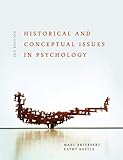Historical and conceptual issues in psychology / Marc Brysbaert and Kathy Rastle.
Material type: TextPublisher: Harlow ; Hoboken : Pearson, 2020Edition: Third editionDescription: xvi, 693 pages : illustrations ; 25 cmContent type:
TextPublisher: Harlow ; Hoboken : Pearson, 2020Edition: Third editionDescription: xvi, 693 pages : illustrations ; 25 cmContent type: - text
- unmediated
- 9781292130255
- 150.9 BR.H 2020 23
- BF81
| Item type | Current library | Collection | Call number | Status | Date due | Barcode | |
|---|---|---|---|---|---|---|---|
|
|
The Knowledge Hub Library | Psychology | 150.9 BR.H 2020 (Browse shelf(Opens below)) | Available | 210407 | ||
|
|
The Knowledge Hub Library | Psychology | 150.9 BR.H 2020 (Browse shelf(Opens below)) | Available | 210408 |
Includes bibliographical references and index.
1. The wider picture Where did it all start? -- 2. The scientific revolution of the seventeenth century and its aftermath -- 3. Eighteenth- and nineteenth-century precursors to a scientific psychology -- 4. Establishing psychology as an independent academic discipline -- 5. Strengthening the scientific standing of psychology Behaviourism and cognitive psychology -- 6. The input from brain research -- 7. The mind-brain problem, free will and consciousness -- 8. How did psychology affect everyday life? The history of applied psychology -- 9. What is science? -- 10. Is psychology a science? -- 11. The contribution of quantitative and qualitative research methods -- 12. The precarious balance between biological, psychological and social influences -- 13. Psychology and society The socio-political side -- Epilogue -- Notes -- Glossary -- Bibliography -- Index.
"From time to time it is good to pause and wonder how we got where we are now. For instance, why did you open this book? How did you become interested in psychology? But also: for how long has one been able to study psychology? Why has this book been published? Why do all good degrees of psychology today include a course on historical and conceptual issues? What is the position of psychology in society? Is psychology really a science? What is a science? These are some of the questions addressed in this book (although you will not be surprised to hear that many of them cannot be fully answered on the basis of present knowledge). They refer to the historical and conceptual foundations of psychology. Historical issues refer to the past of the discipline and can be approached in many different ways (see Chapter 10). One distinction is whether history is studied to find out what people at different points in time thought and knew, or whether history is studied to gain insight into how the present situation came about. The latter is the approach taken in this book, because it is of particular relevance to everyone wanting to become a psychologist"-- Provided by publisher.
Description based on print version record and CIP data provided by publisher; resource not viewed.
There are no comments on this title.

